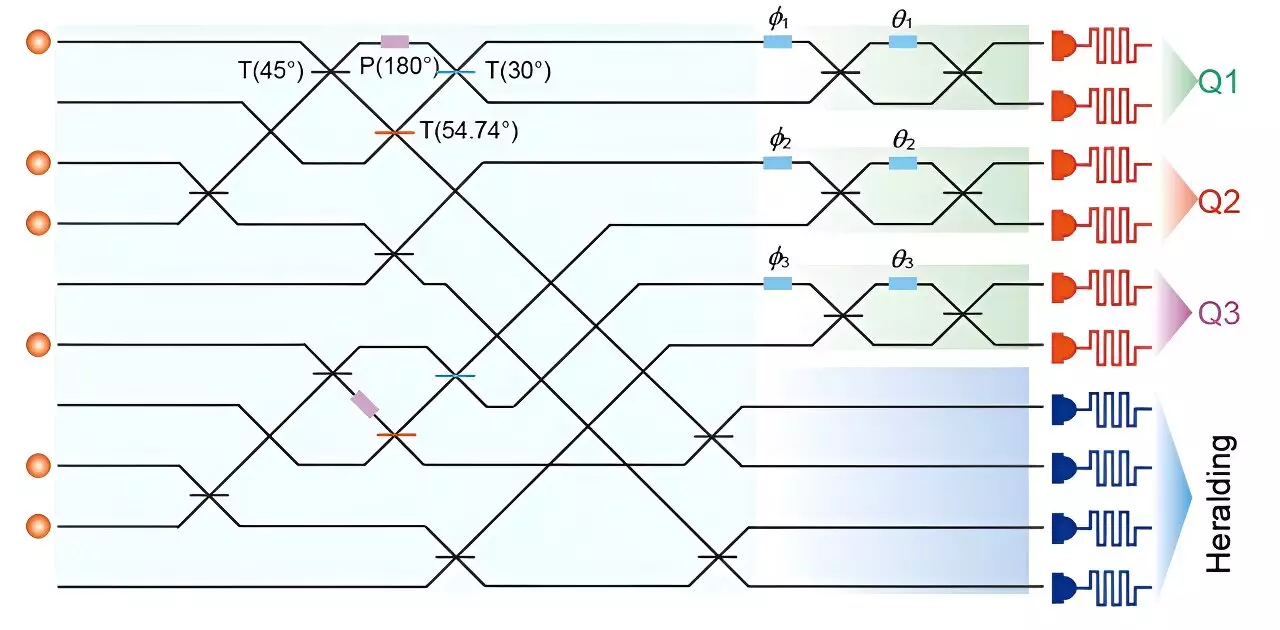Photonic quantum computers are revolutionary tools poised to transform the world of computing by leveraging quantum physics and utilizing photons as units of information processing. These computers have the potential to outperform traditional quantum computers in terms of speed and transmission of information over long distances. However, the journey towards achieving the desired results with photonic quantum computers has not been without its challenges, mainly due to the weak interactions between individual photons.
In a recent publication in Physical Review Letters, researchers at the University of Science and Technology of China presented a breakthrough in the form of a large cluster state that could facilitate quantum computation in a photonic system. This state, known as three-photon entanglement, opens up new possibilities for advancing the field of photonic quantum computing. Hui Wang, one of the co-authors of the paper, emphasized the operational advantages of photonic quantum computing at room temperature and minimal decoherence.
Scalable Approaches
Previous studies have suggested that fusion and percolation could offer scalable approaches to quantum computation in photonic systems without the need for deterministic entangling gates. Wang and his team focused on fusing small resource states, like the 3-GHZ state they demonstrated, into large-scale cluster states suitable for measurement-based quantum computing. This strategy is a significant step towards realizing fault-tolerant photonic quantum computing.
The researchers successfully generated a 3-GHZ state using near-deterministic methods, marking a significant milestone in the development of fault-tolerant photonic quantum computers. By employing an InAs/GaAs quantum dot as the single-photon source and a programmable interferometer with high efficiency, they were able to create a dual-rail encoded heralded 3-GHZ state. This achievement paves the way for the implementation of large-scale optical quantum computers based on 3-GHZ states for processing quantum information.
Advancements in Quantum Computing
The recent work by Wang and his colleagues builds upon earlier breakthroughs in heralded single photons and entangled photon pairs. Their demonstration of a large cluster state brings us closer to the realization of fault-tolerant, measurement-based quantum computing using photonic chips. The publication of their paper coinciding with other related studies in renowned journals indicates a collective push towards the effective implementation of fault-tolerant photonic quantum computers.
Future Prospects
Looking ahead, Wang envisions a future where the demonstration of a fusion gate surpassing the percolation threshold using eight single photons is within reach. By leveraging the success of the heralded 3-GHZ state, multiple resource states can be combined to form an even more extensive entangled state. These advancements lay the groundwork for the development of high-performance photonic quantum computers capable of handling complex computational tasks with unprecedented efficiency and reliability.
The field of photonic quantum computing is rapidly evolving, with researchers making significant strides towards overcoming the inherent challenges and harnessing the full potential of photons for quantum information processing. The work by Wang and his team represents a crucial step forward in realizing fault-tolerant photonic quantum computers and sets the stage for future innovations in the realm of quantum computing.


Leave a Reply
You must be logged in to post a comment.